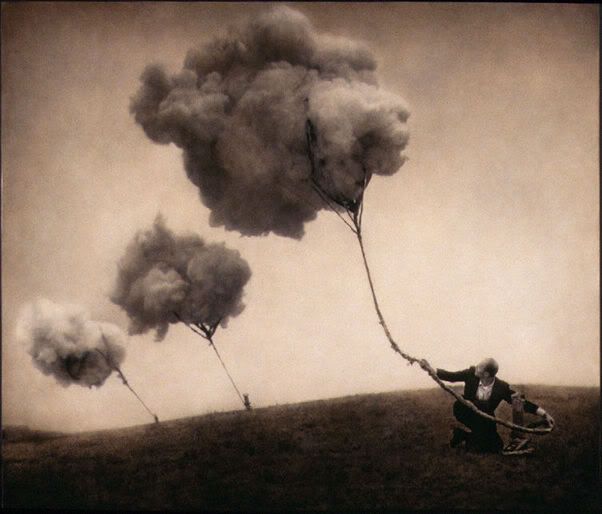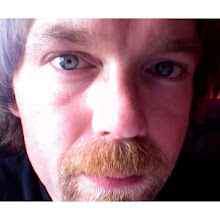Saturday, July 26, 2008
Tornado in downtown Atlanta for the first time on record, March 14th 2008 at 9:45pm
The Dalai Lama has an office in Atlanta, at Emory University since being offered a position there last Spring. March 14 of course, was the same day rioting broke out in Lhasa, the Tibetan capital.
Friday, July 25, 2008
"A Color of the Sky" by Tony Hoagland
Windy today and I feel less than brilliant,
driving over the hills from work.
There are the dark parts on the road
when you pass through clumps of wood
and the bright spots where you have a view of the ocean,
but that doesn’t make the road an allegory.
I should call Marie and apologize
for being so boring at dinner last night,
but can I really promise not to be that way again?
And anyway, I’d rather watch the trees, tossing
in what certainly looks like sexual arousal.
Otherwise it’s spring, and everything looks frail;
the sky is baby blue, and the just-unfurling leaves
are full of infant chlorophyll,
the very tint of inexperience.
Last summer’s song is making a comeback on the radio,
and on the highway overpass,
the only metaphysical vandal in America has written
MEMORY LOVES TIME
in big black spraypaint letters,
which makes us wonder if Time loves Memory back.
Last night I dreamed of X again.
She’s like a stain on my subconscious sheets.
Years ago she penetrated me
but though I scrubbed and scrubbed and scrubbed,
I never got her out,
but now I’m glad.
What I thought was an end turned out to be a middle.
What I thought was a brick wall turned out to be a tunnel.
What I thought was an injustice
turned out to be a color of the sky.
Outside the youth center, between the liquor store
and the police station,
a little dogwood tree is losing its mind;
overflowing with blossomfoam,
like a sudsy mug of beer;
like a bride ripping off her clothes,
dropping snow white petals to the ground in clouds,
so Nature’s wastefulness seems quietly obscene.
It’s been doing that all week:
making beauty,
and throwing it away,
and making more.
from What Narcissism Means to Me © 2003
driving over the hills from work.
There are the dark parts on the road
when you pass through clumps of wood
and the bright spots where you have a view of the ocean,
but that doesn’t make the road an allegory.
I should call Marie and apologize
for being so boring at dinner last night,
but can I really promise not to be that way again?
And anyway, I’d rather watch the trees, tossing
in what certainly looks like sexual arousal.
Otherwise it’s spring, and everything looks frail;
the sky is baby blue, and the just-unfurling leaves
are full of infant chlorophyll,
the very tint of inexperience.
Last summer’s song is making a comeback on the radio,
and on the highway overpass,
the only metaphysical vandal in America has written
MEMORY LOVES TIME
in big black spraypaint letters,
which makes us wonder if Time loves Memory back.
Last night I dreamed of X again.
She’s like a stain on my subconscious sheets.
Years ago she penetrated me
but though I scrubbed and scrubbed and scrubbed,
I never got her out,
but now I’m glad.
What I thought was an end turned out to be a middle.
What I thought was a brick wall turned out to be a tunnel.
What I thought was an injustice
turned out to be a color of the sky.
Outside the youth center, between the liquor store
and the police station,
a little dogwood tree is losing its mind;
overflowing with blossomfoam,
like a sudsy mug of beer;
like a bride ripping off her clothes,
dropping snow white petals to the ground in clouds,
so Nature’s wastefulness seems quietly obscene.
It’s been doing that all week:
making beauty,
and throwing it away,
and making more.
from What Narcissism Means to Me © 2003
Artist behind Beijing's 'bird's nest' stadium boycotts Olympics

The Chinese artist behind the stunning Olympic stadium in Beijing, nicknamed The Bird's Nest, has lambasted the 2008 Games and says he wants no part in promoting it.
"I would rather be disconnected or forgotten," Ai Weiwei told The Guardian newspaper.
The Chinese National Olympic Stadium, also known as the Bird's Nest, holds 91,000 people.The Chinese National Olympic Stadium, also known as the Bird's Nest, holds 91,000 people.

Ai, a prominent artist and designer living in Beijing, was hired by the Swiss firm Herzog & de Meuron to help create a design for the 91,000-seat stadium. The $400-million building has been hailed as an architectural wonder, with its ribbons of intersecting steel resembling a bird's nest.
The artist is incensed by the positive show the Chinese government is putting forth ahead of the games, set to open Aug. 8, 2008, ignoring its human rights record.

"I hate the kind of feeling stirred up by promotion or propaganda … It's the kind of sentiment when you don't stick to the facts, but try to make up something, to mislead people away from a true discussion."
Ai says he hates that the stadium has become a shining symbol of China's march towards modernism. He calls it a "pretend smile."
"I would feel ashamed if I just designed something for glamour or to show some kind of fake image."
Ai also had choice words for other artistic types participating in the hoopla — filmmakers Steven Spielberg and Zhang Yimou, a former classmate from their days at the Beijing Film Academy.
"It's disgusting. I don't like anyone who shamelessly abuses their profession, who makes no moral judgment."
Organizers announced last April that Spielberg and Yimou had been hired as artistic consultants for the opening and closing ceremonies.
Spielberg has indicated he would pull out if China opposed a measure to increase UN peacekeepers in Darfur. That proposition recently passed.
'I did it because I love design...'—Ai WeiWei

The director said he would like the ceremonies to "give the world a taste of peace, friendship and understanding."
While Ai castigates the Chinese government and those involved in the Olympics, the artist says he has no regrets designing the stadium.
"I did it because I love design and the idea of how it would be looked at by others."
The 50-year-old comes by his anti-authoritarianism honestly. He spent much of his childhood in a remote province where his father, Ai Qin, one of China's most respected modern poets, was exiled during the Communist era for being an enemy of the state.
"I spent five years with him at a labour camp where he cleaned toilets," he told the website Gamesbid.com
Five years ago, police shut down a show curated by Ai. It included self-mutilation, human corpses and body parts.
--------
 Saturday, August 11, 2007 | CBC Arts
Saturday, August 11, 2007 | CBC ArtsBeijing Olympics Mascots

The Fuwa (Chinese: 福娃; pinyin: Fúwá; literally "good-luck dolls" and can be known as "Friendlies"), are the mascots of the 2008 Summer Olympics in Beijing. The designs were created by Han Meilin, a famous Chinese artist. The designs were publicly announced by the National Society of Chinese Classic Literature Studies on November 11, 2005 at an event marking the 1000th day before the opening of the games.
Herman Melville

Misgivings
When ocean-clouds over inland hills
Sweep storming in late autumn brown,
And horror the sodden valley fills,
And the spire falls crashing in the town,
I muse upon my country's ills--
The tempest burning from the waste of Time
On the world's fairest hope linked with man's foulest crime.
Nature's dark side is heeded now--
(Ah! optimist-cheer disheartened flown)--
A child may read the moody brow
Of yon black mountain lone.
With shouts the torrents down the gorges go,
And storms are formed behind the storms we feel:
The hemlock shakes in the rafter, the oak in the driving keel.

Excerpts from The Lightning-Rod Man
What grand irregular thunder, thought I, standing on my hearthstone among the Acroceraunian hills, as the scattered bolts boomed overhead and crashed down among the valleys, every bolt followed by zigzag irradiations, and swift slants of sharp rain, which audibly rang, like a charge of spear-points, on my low shingled roof. I suppose, though, that the mountains hereabouts break and churn up the thunder, so that it is far more glorious here than on the plain. Hark! -- some one at the door. Who is this that chooses a time of thunder for making calls? And why don't he, man-fashion, use the knocker, instead of making that doleful undertaker's clatter with his fist against the hollow panel? But let him in. Ah, here he comes. "Good day, sir:" an entire stranger. "Pray be seated." What is that strange-looking walking-stick he carries: "A fine thunder-storm, sir."
"Fine? -- Awful!"
"You are wet. Stand here on the hearth before the fire."
"Not for worlds."
The stranger still stood in the exact middle of the cottage, where he had first planted himself. His singularity impelled a closer scrutiny. A lean, gloomy figure. Hair dark and lank, mattedly streaked over his brow. His sunken pitfalls of eyes were ringed by indigo halos, and played with an innocuous sort of lightning: the gleam without the bolt. The whole man was dripping. He stood in a puddle on the bare oak floor: his strange-walking stick vertically resting at his side.
It was a polished copper rod, four feet long, lengthwise attached to a neat wooden staff, by insertion into two balls of greenish glass, ringed with copper bands. The metal rod terminated at the top tripodwise, in three keen tines, brightly gilt. He held the thing by the wooden part alone.
"Sir," said I, bowing politely, "have I the honor of a visit from that illustrious God, Jupiter Tonans? So stood he in the Greek statue of old, grasping the lightning-bolt. If you be he, or his viceroy, I have to thank you for this noble storm you have brewed among our mountains. Listen: that was a glorious peal. Ah, to a lover of the majestic, it is a good thing to have the Thunderer himself in one's cottage. The thunder grows finer for that. But pray be seated. This old rush- bottomed arm-chair, I grant, is a poor substitute for your evergreen throne on Olympus; but, condescend to be seated."
While I thus pleasantly spoke, the stranger eyed me, half in wonder, and half in a strange sort of horror; but did not move a foot.
* * * * *
"My special business is to travel the country for orders for lightning-rods. This is my specimen rod;" tapping his staff; "I have the best of references" -- fumbling in his pockets. "In Criggan last month, I put up three-and-twenty rods on only five buildings."
"Let me see. Was it not at Criggan last week, about midnight on Saturday, that the steeple, the big elm, and the assembly-room cupola were struck? Any of your rods there?"
"Not on the tree and cupola, but on the steeple."
"Of what use is your rod, then?"
"Of life-and-death use. But my workman was heedless. In fitting the rod at top to the steeple, he allowed a part of the metal to graze the tin sheeting. Hence the accident. Not my fault, but his. Hark!"
"Never mind. That clap burst quite loud enough to be heard without finger-pointing. Did you hear of the event at Montreal last year? A servant-girl struck at her bedside with a rosary in her hand; the beads being metal. Does your beat extend into the Canadas?"
"No. And I hear that there, iron rods only are in use. They should have mine, which are copper. Iron is easily fused.
* * * * *
"You pretended envoy extraordinary and minister plenipotentiary to and from Jupiter Tonans," laughed I; "you mere man who come here to put you and your pipestem between clay and sky, do you think that because you can strike a bit of green light from the Leyden jar, that you can thoroughly avert the supernal bolt? Your rod rusts, or breaks, and where are you? Who has empowered you, you Tetzel, to peddle round your indulgences from divine ordinations? The hairs of our heads are numbered, and the days of our lives. In thunder as in sunshine, I stand at ease in the hands of my God. False negotiator, away! See, the scroll of the storm is rolled back; the house is unharmed; and in the blue heavens I read in the rainbow, that the Deity will not, of purpose, make war on man's earth."
"Impious wretch!" foamed the stranger, blackening in the face as the rainbow beamed. "I will publish your infidel notions."
"Begone! move quickly! if quickly you can, you that shine forth into sight in moist times like the worm."
The scowl grew blacker on his face; the indigo-circles enlarged round his eyes as the storm rings round the midnight moon. He sprang upon me; his tri-forked thing at my heart.
I seized it; I snapped it; I dashed it; I trod it; and dragging the dark lightning-king out of my door, flung his elbowed, copper sceptre after him.
But spite of my treatment, and spite of my dissuasive talk of him to my neighbors, the Lightning-rod man still dwells in the land; still travels in storm-time, and drives a brave trade with the fears of man.
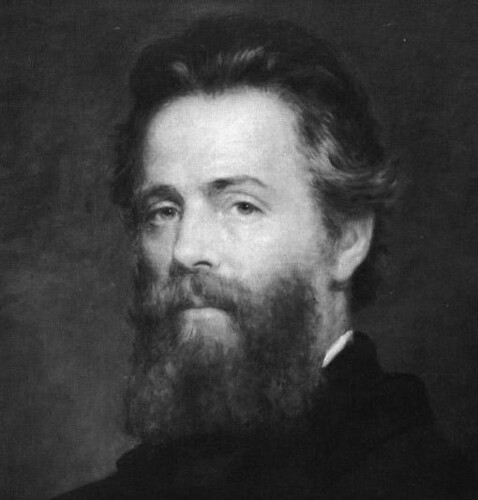
Thursday, July 24, 2008
“The Future” by Wesley McNair

On the afternoon talk shows of America
the guests have suffered life's sorrows
long enough. All they require now
is the opportunity for closure,
to put the whole thing behind them
and get on with their lives. That their lives,
in fact, are getting on with them even
as they announce their requirement
is written on the faces of the younger ones
wrinkling their brows, and the skin
of their elders collecting just under their
set chins. It's not easy to escape the past,
but who wouldn't want to live in a future
where the worst has already happened
and Americans can finally relax after daring
to demand a different way? For the rest of us,
the future, barring variations, turns out
to be not so different from the present
where we have always lived - the same
struggle of wishes and losses, and hope,
that old lieutenant, picking us up
every so often to dust us off and adjust
our helmets. Adjustment, for that matter,
may be the one lesson hope has to give,
serving us best when we begin to find
what we didn't know we wanted in what
the future brings. Nobody would have asked
for the ice storm that takes down trees
and knocks the power out, leaving nothing
but two buckets of snow melting
on the wood stove and candlelight so weak,
the old man sitting at the kitchen table
can hardly see to play cards. Yet how else
but by the old woman's laughter
when he mistakes a jack for a queen
would he look at her face in the half-light as if
for the first time while the kitchen around them
and the very cards he holds in his hands
disappear? In the deep moment of his looking
and her looking back, there is no future,
only right now, all, anyway, each one of us
has ever had, and all the two of them,
sitting together in the dark among the cracked
notes of the snow thawing beside them
on the stove, right now will ever need.
"Another country where things are in order"
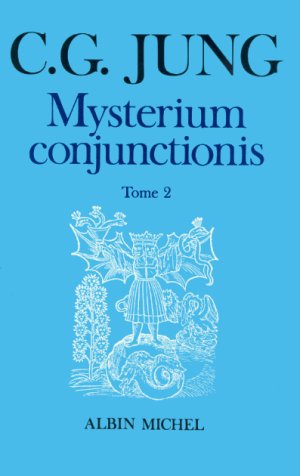
There was a great drought where Wilhelm lived; for months there had not been a drop of rain and the situation became catastrophic. The Catholics made processions, the Protestants made prayers, and the Chinese burned joss-sticks and shot off guns to frighten away the demons of the drought, but with no result.Mysterium Conjunctionis, by Carl Jung
Finally the Chinese said, ‘We will fetch the rain-maker.’ And from another province a dried up old man appeared. The only thing he asked for was a quiet little house somewhere, and there he locked himself in for three days.
On the fourth day the clouds gathered and there was a great snow-storm at the time of the year when no snow was expected, an unusual amount, and the town was so full of rumours about the wonderful rain-maker that Wilhelm went to ask the man how he did it.
In true European fashion he said: ‘They call you the rain-maker; will you tell me how you made the snow?’
And the little Chinese said: ‘I did not make the snow; I am not responsible.’
‘But what have you done these three days?’
‘Oh, I can explain that. I come from another country where things are in order. Here they are out of order; they are not as they should be by the ordinance of heaven. Therefore the whole country is not in Tao, and I also am not in the natural order of things because I am in a disordered country. So I had to wait three days until I was back in Tao and then naturally the rain came.’”
Wednesday, July 23, 2008
Tewkesbury, UK - July 23, 2008
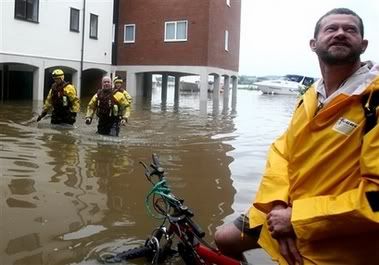
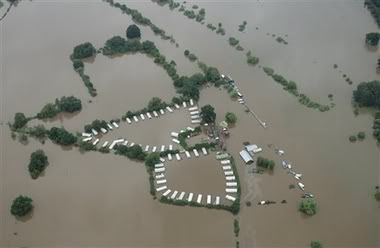
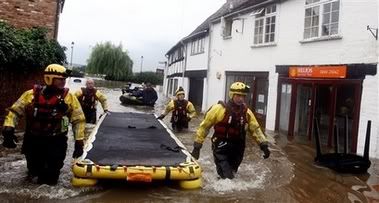
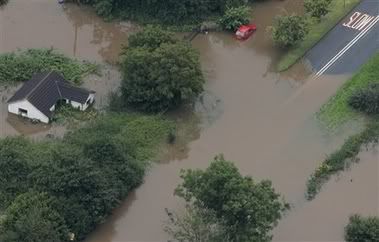
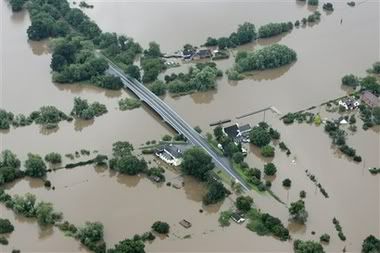
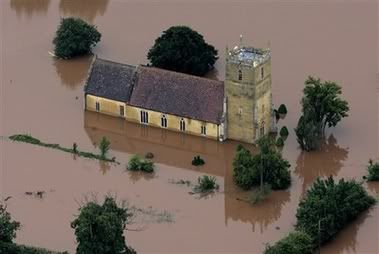
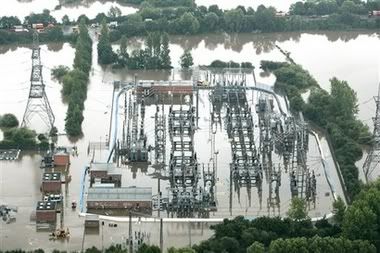
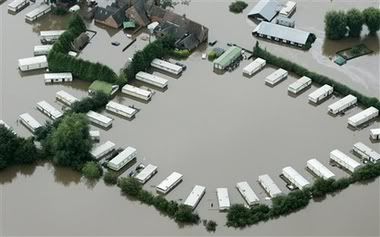
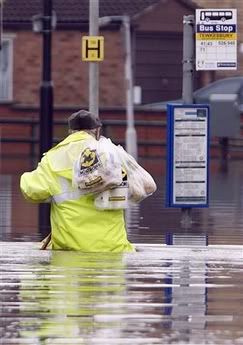
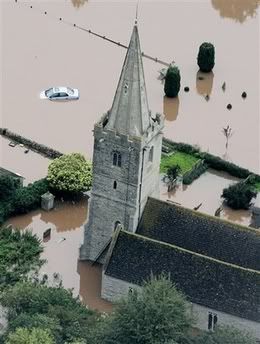
...And for good measure, check out the webcomic "Freakangels" by Warren Ellis, about some very curious individuals in England who survived a catastrophic worldwide flood.
Note especially the monologue in Episode 4 describing the nature of time after the apocalypse. (Click on Thumbnails to view.)
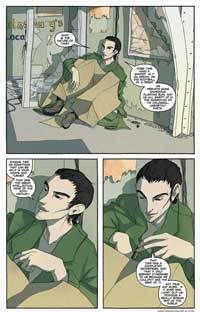
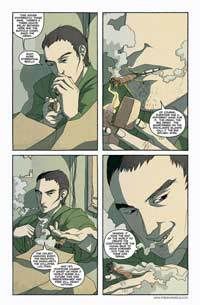
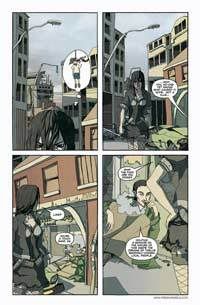
Buddhism and Science
The Venerable Hsuan Hua, a Ch'an and Tripitika master from China, arrived in America in the early 1960s to propagate the Dharma in the West. As he observed and studied the trends and currents of contemporary thought, he showed little enthusiasm for what seemed to him the exaggerated claims of modern science—theoretical or applied. He said, “Within the limited world of the relative, that is where science is. It’s not an absolute Dharma. Science absolutely cannot bring true and ultimate happiness to people, neither spiritually nor materially.” This is strong criticism that portrays science as a discipline limited to relative truths, and as an unsatisfactory way of life. In another essay, he wrote:From Buddhism and Science: Probing the Boundaries of Faith and Reason by Dr. Martin J. Verhoeven
Look at modern science. Military weapons are modernized every day and are more and more novel every month. Although we call this progress, it’s nothing more than progressive cruelty. Science takes human life as an experiment, as child’s play, as it fulfills its desires through force and oppression.
In 1989, Venerable Walpola Rahula, a Theravadin monk from Sri Lanka, also warned that daily life is being permeated by science. He cautioned, “We have almost become slaves of science and technology; soon we shall be worshipping it.” His comments come well into the final decades of the twentieth century, when many people had in effect turned science into a religious surrogate. The Venerable monk observed, “Early symptoms are that they tend to seek support from science to prove the validity of our religions.” Walpola Rahula elaborated on this point:
We justify them [i.e. religions] and make them modern, up-to-date, respectable, and accessible. Although this is somewhat well intentioned, it is ill-advised. While there are some similarities and parallel truths, such as the nature of the atom, the relativity of time and space, or the quantum view of the interdependent, interrelated whole, all these things were developed by insight and purified by meditation.
Religion East and West, Issue 1, June 2001, pp. 77-97
Zen is boring
"There are definite styles of boredom. The Zen tradition in Japan creates a definite style of boredom in it's monasteries. Sit, cook, eat. Sit zazen and do your walking meditation and so on. But to an American novice who goes to Japan or takes part in traditional Japanese practice in this country, the message of boredom is not communicated properly. Instead, if I may say so, it turns into a militant appreciation of rigidity, or an aesthetic appreciation of simplicity, rather than actually being bored, which is strange. Actually it was not designed to be that way. To the Japanese, Zen practice is ordinary Japanese life-situation in which you just do your daily work and sit a lot of zazen. But Americans appreciate the little details, how you use your bowl and how you eat consciously in zazen posture. This is only supposed to create a feeling of boredomm but to American students it is a work of art. Cleaning your bowl, washing it out, folding your white napkin and so forth, becomes living theater. The black cushion is supposed to suggest no color, complete boredom. But for Americans it inspires a mentality of militant blackness, straightforwardness."from The Myth of Freedom by Chogyam Trungpa
Monday, July 21, 2008
Wednesday, July 16, 2008
Voice from the Whirlwind
The Book of Job
Chapter 38
Then the LORD answered Job out of the whirlwind, and said, Who is this that darkeneth counsel by words without knowledge? Gird up now thy loins like a man; for I will demand of thee, and answer thou me.
Where wast thou when I laid the foundations of the earth? declare, if thou hast understanding.
Who hath laid the measures thereof, if thou knowest? or who hath stretched the line upon it? Whereupon are the foundations thereof fastened? or who laid the corner stone thereof; When the morning stars sang together, and all the sons of God shouted for joy? Or who shut up the sea with doors, when it brake forth, as if it had issued out of the womb? When I made the cloud the garment thereof, and thick darkness a swaddlingband for it, And brake up for it my decreed place, and set bars and doors, And said, Hitherto shalt thou come, but no further: and here shall thy proud waves be stayed? Hast thou commanded the morning since thy days; and caused the dayspring to know his place; That it might take hold of the ends of the earth, that the wicked might be shaken out of it? 38:14 It is turned as clay to the seal; and they stand as a garment.
And from the wicked their light is withholden, and the high arm shall be broken.
Hast thou entered into the springs of the sea? or hast thou walked in the search of the depth? Have the gates of death been opened unto thee? or hast thou seen the doors of the shadow of death? Hast thou perceived the breadth of the earth? declare if thou knowest it all.
Where is the way where light dwelleth? and as for darkness, where is the place thereof, That thou shouldest take it to the bound thereof, and that thou shouldest know the paths to the house thereof? Knowest thou it, because thou wast then born? or because the number of thy days is great? Hast thou entered into the treasures of the snow? or hast thou seen the treasures of the hail, Which I have reserved against the time of trouble, against the day of battle and war? By what way is the light parted, which scattereth the east wind upon the earth? Who hath divided a watercourse for the overflowing of waters, or a way for the lightning of thunder; To cause it to rain on the earth, where no man is; on the wilderness, wherein there is no man; To satisfy the desolate and waste ground; and to cause the bud of the tender herb to spring forth? Hath the rain a father? or who hath begotten the drops of dew? Out of whose womb came the ice? and the hoary frost of heaven, who hath gendered it? The waters are hid as with a stone, and the face of the deep is frozen.
Canst thou bind the sweet influences of Pleiades, or loose the bands of Orion? Canst thou bring forth Mazzaroth in his season? or canst thou guide Arcturus with his sons? Knowest thou the ordinances of heaven? canst thou set the dominion thereof in the earth? Canst thou lift up thy voice to the clouds, that abundance of waters may cover thee? Canst thou send lightnings, that they may go and say unto thee, Here we are? Who hath put wisdom in the inward parts? or who hath given understanding to the heart? Who can number the clouds in wisdom? or who can stay the bottles of heaven, When the dust groweth into hardness, and the clods cleave fast together? Wilt thou hunt the prey for the lion? or fill the appetite of the young lions, When they couch in their dens, and abide in the covert to lie in wait? Who provideth for the raven his food? when his young ones cry unto God, they wander for lack of meat.
Chapter 38
Then the LORD answered Job out of the whirlwind, and said, Who is this that darkeneth counsel by words without knowledge? Gird up now thy loins like a man; for I will demand of thee, and answer thou me.
Where wast thou when I laid the foundations of the earth? declare, if thou hast understanding.
Who hath laid the measures thereof, if thou knowest? or who hath stretched the line upon it? Whereupon are the foundations thereof fastened? or who laid the corner stone thereof; When the morning stars sang together, and all the sons of God shouted for joy? Or who shut up the sea with doors, when it brake forth, as if it had issued out of the womb? When I made the cloud the garment thereof, and thick darkness a swaddlingband for it, And brake up for it my decreed place, and set bars and doors, And said, Hitherto shalt thou come, but no further: and here shall thy proud waves be stayed? Hast thou commanded the morning since thy days; and caused the dayspring to know his place; That it might take hold of the ends of the earth, that the wicked might be shaken out of it? 38:14 It is turned as clay to the seal; and they stand as a garment.
And from the wicked their light is withholden, and the high arm shall be broken.
Hast thou entered into the springs of the sea? or hast thou walked in the search of the depth? Have the gates of death been opened unto thee? or hast thou seen the doors of the shadow of death? Hast thou perceived the breadth of the earth? declare if thou knowest it all.
Where is the way where light dwelleth? and as for darkness, where is the place thereof, That thou shouldest take it to the bound thereof, and that thou shouldest know the paths to the house thereof? Knowest thou it, because thou wast then born? or because the number of thy days is great? Hast thou entered into the treasures of the snow? or hast thou seen the treasures of the hail, Which I have reserved against the time of trouble, against the day of battle and war? By what way is the light parted, which scattereth the east wind upon the earth? Who hath divided a watercourse for the overflowing of waters, or a way for the lightning of thunder; To cause it to rain on the earth, where no man is; on the wilderness, wherein there is no man; To satisfy the desolate and waste ground; and to cause the bud of the tender herb to spring forth? Hath the rain a father? or who hath begotten the drops of dew? Out of whose womb came the ice? and the hoary frost of heaven, who hath gendered it? The waters are hid as with a stone, and the face of the deep is frozen.
Canst thou bind the sweet influences of Pleiades, or loose the bands of Orion? Canst thou bring forth Mazzaroth in his season? or canst thou guide Arcturus with his sons? Knowest thou the ordinances of heaven? canst thou set the dominion thereof in the earth? Canst thou lift up thy voice to the clouds, that abundance of waters may cover thee? Canst thou send lightnings, that they may go and say unto thee, Here we are? Who hath put wisdom in the inward parts? or who hath given understanding to the heart? Who can number the clouds in wisdom? or who can stay the bottles of heaven, When the dust groweth into hardness, and the clods cleave fast together? Wilt thou hunt the prey for the lion? or fill the appetite of the young lions, When they couch in their dens, and abide in the covert to lie in wait? Who provideth for the raven his food? when his young ones cry unto God, they wander for lack of meat.
Chinese government announces new cannons which can disperse rain over their goose egg stadium in Beijing during the Olympics, laughing, proclaim "we are nowe the maseters of nature". They are repaid by a catastrophic blizzard which shut down the entire half of the country and stranded 200 million people in transit in the week before Chinese New year, that country's most important holiday.
This was only phase 1.
This was only phase 1.
Subscribe to:
Comments (Atom)
